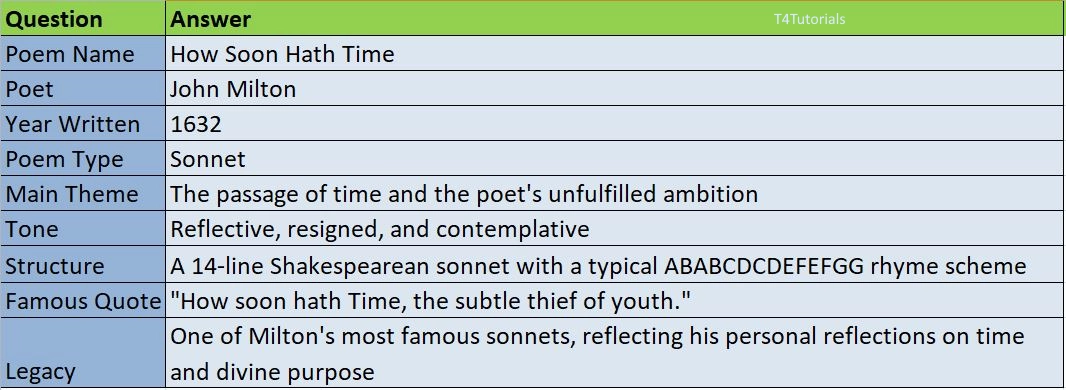Summary:
How Soon Hath Time is a sonnet written by John Milton, reflecting on the passage of time and the personal feelings of the poet. Milton, who was in his early twenties when he wrote this poem, expresses a sense of frustration and sorrow about the rapid passage of time. He laments that time has passed quickly, and in doing so, he has not yet achieved all that he hoped to accomplish. In the poem, Milton uses the metaphor of a “young man” in relation to his own age and compares his unfulfilled ambitions with the reality of life’s fleeting nature. He concludes by acknowledging that time has its own purpose, and that everything happens according to God’s will, suggesting that his life and achievements will be fulfilled in time, as per divine design.
MCQs:
- What is the main theme of How Soon Hath Time?
a) The beauty of youth
b) The passage of time and unfulfilled ambition
c) The joy of love
d) The importance of education
Answer: b) The passage of time and unfulfilled ambition - Who is the speaker in How Soon Hath Time?
a) A young lover
b) John Milton himself
c) A wise elder
d) A religious figure
Answer: b) John Milton himself - How does the poet feel about the passing of time in How Soon Hath Time?
a) Indifferent
b) Joyful and accepting
c) Sad and frustrated
d) Grateful for every moment
Answer: c) Sad and frustrated - What does Milton lament about in How Soon Hath Time?
a) His lack of material wealth
b) His inability to accomplish all he had hoped to by a certain age
c) His failure in love
d) His lack of recognition as a poet
Answer: b) His inability to accomplish all he had hoped to by a certain age - What does Milton believe about the passage of time in How Soon Hath Time?
a) Time is irrelevant to human life
b) Time moves too quickly and disrupts life plans
c) Time is guided by God’s will and purpose
d) Time is an illusion
Answer: c) Time is guided by God’s will and purpose - How does the poet suggest that he will be fulfilled in the future?
a) Through wealth and fame
b) Through God’s will and purpose
c) Through his accomplishments
d) Through marriage
Answer: b) Through God’s will and purpose - What literary form is How Soon Hath Time?
a) Free verse
b) Sonnet
c) Lyric poem
d) Haiku
Answer: b) Sonnet - What does Milton compare his unfulfilled ambitions to in How Soon Hath Time?
a) A flower that never blooms
b) A bird that never flies
c) A young man who has yet to achieve greatness
d) A dream that fades away
Answer: c) A young man who has yet to achieve greatness - Which of the following best describes the tone of How Soon Hath Time?
a) Confident and optimistic
b) Reflective and resigned
c) Angry and rebellious
d) Joyful and celebratory
Answer: b) Reflective and resigned - In How Soon Hath Time, what is Milton’s view on the passage of time?
a) He believes it should be ignored
b) He sees it as a divine process that shapes life according to God’s plan
c) He views it as a punishment
d) He sees it as something that should be celebrated
Answer: b) He sees it as a divine process that shapes life according to God’s plan
| Question | Answer |
| Poem Name | How Soon Hath Time |
| Poet | John Milton |
| Year Written | 1632 |
| Poem Type | Sonnet |
| Main Theme | The passage of time and the poet’s unfulfilled ambition |
| Tone | Reflective, resigned, and contemplative |
| Structure | A 14-line Shakespearean sonnet with a typical ABABCDCDEFEFGG rhyme scheme |
| Famous Quote | “How soon hath Time, the subtle thief of youth.” |
| Legacy | One of Milton’s most famous sonnets, reflecting his personal reflections on time and divine purpose |
